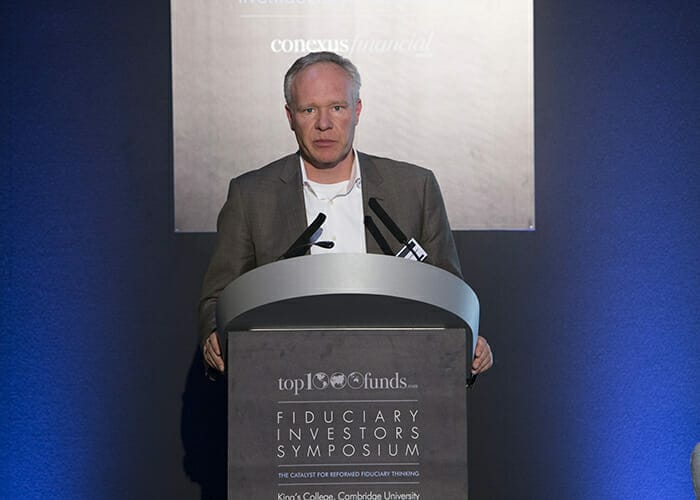In a discussion on long-term investing that framed the themes for the conference, managing director of strategy at PGGM, Jaap van Dam, urged investors to think differently about how they invest, introducing the notion that investors shouldn’t focus on the returns to individual members but the societal benefits of long-term behaviour.
Van Dam reminded the audience that the purpose of a pension fund is to turn savings into wealth, not to harvest the market return or create alpha.
“Because of our scale and knowledge, and our position in the long financial chain from the actual saver of capital to the user of capital, we can and should do things differently,” he said.
In particular he said there is a fundamental notion to connect investing with the real world, and that investors have greatly understated stewardship.
Van Dam also spoke about the OECD’s notion of productive capital, which supports infrastructure development, investment in the green economy and sustainable growth. This, he said, introduces the environment and the benefits for society at large when investing with a long horizon.
“I feel that if we do not seriously address both issues, putting our capital to work where it is needed to generate long-term wealth, then we stand to lose our license to operate in the long term.”
He said the OECD outlined the importance of long-term investing because patient capital allows investors to access illiquidity premia, lowers turnover, encourages less pro-cyclical investment strategies and therefore higher net investment rate of returns and greater stability; and, further, that engaged capital encourages active voting policies, leading to better corporate governance.
“So, logically, the OECD is not per se focusing on the returns for the individual investor, but more on the societal benefits of long-term investor behaviour.”
The theme of long-term investments and connecting with the real world was carried into the panel discussion chaired by Stephen Kotkin, John P Birkelund ‘52 Professor in History and International Affairs at Princeton University.
Investors – Roger Gray, the chief investment officer of USS, and Christian Seymour, head of Europe for IFM – sat alongside Raffaele Della Croce, lead manager on the long-term investing project at the OECD, and Sharan Burrow, general secretary at the International Trade Union Confederation (ITUC).
Delegates were reminded that they are stewards of other people’s money, and investing should be focused on creating long-term value for members and stakeholders.
In particular, Burrow urged investors to do more, and said that workers are demanding investments be directed towards patient, responsible investments.
“Long-term investment principles simply make sense. For workers, as the asset owners of pension funds, the time horizon to realise secure retirement incomes is not linked to short-term investment,” she said.
“Institutional investors, governments and financial regulators all have significant roles but asset owners – workers – demand serious change for pension fund outlays.”
Burrow said the principles of long-term investment are obvious and the ITUC has supported the development of the OECD framework and the G20 adoption. She said:
Patient capital is the antidote to speculative vulnerability and vital to the infrastructure build necessary to generate jobs and growth along with the industrial transformation vital for climate action.
Engagement is critical to monitor company commitments. Our demand for every company to have a plan for decarbonisation and jobs requires direct monitoring as does the management of other risks including the corporate governance required to avoid corruption or excessive leverage.
Productive capital requires the commitment to fund sustainable infrastructure including clean energy and carbon-neutral urban build and transport.
And we demand responsible capital that meets the test of the UN business and human rights principles. Human rights and workers’ rights are not negotiable.
“There is an urgent need for investors to more rapidly change their practice – align incentives with long-term investments, and where not large enough for direct and prolonged engagement create pooled funds to enable such. Without long-term investments and jobs – secure jobs with decent wages – the very sustainability of pension funds and potentially mutuals is also at risk,” she said.
“2016 is shaping up to be the most vulnerable year for the global economy since 2008,” Burrow said. “With more than $65 trillion invested in the global economy, the major institutional investors in OECD economies, including our pension funds, have to look to themselves for whole swathes of instability created by short-termism, unquestioning agency dependence and inadequate corporate governance oversight of the companies in which they invest.”
“Tragically, not enough has changed, with today’s average holding of shares around five months compared to more than five years in the 1980s.”



